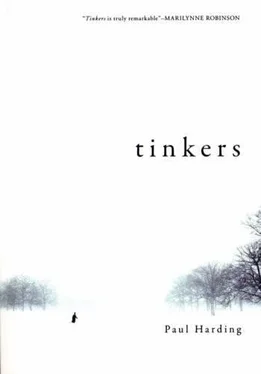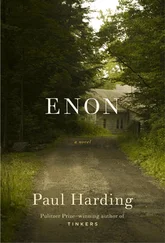Another time, I found him fumbling for an apple in the barrel we kept in the basement. I could just make him out in the gloom. Each time he tried to grab a piece of fruit, it eluded him, or I might say he eluded it, as his grasp was no stronger than a draft of air threading through a crack in a window. He succeeded once, after appearing to concentrate for a moment, in upsetting an apple from its place at the top of the pile, but it merely tumbled down along the backs of the other apples and came to rest against the mouth of the barrel. It seemed to me that even if I could pick an apple up with my failing hands, how could I bite it with my dissipating teeth, digest it with my ethereal gut? I realized that this thought was not my own but, rather, my father's, that even his ideas were leaking out of his former self. Hands, teeth, gut, thoughts even, were all simply more or less convenient to human circumstance, and as my father was receding from human circumstance, so, too, were all of these particulars, back to some unknowable froth where they might be reassigned to be stars or belt buckles, lunar dust or railroad spikes. Perhaps they already were all of these things and my father's fading was because he realized this: My goodness, I am made from planets and wood, diamonds and orange peels, now and then, here and there; the iron in my blood was once the blade of a Roman plow; peel back my scalp and you will see my cranium covered in the scrimshaw carved by an ancient sailor who never suspected that he was whittling at my skull-no, my blood is a Roman plow, my bones are being etched by men with names that mean sea wrestler and ocean rider and the pictures they are making are pictures of northern stars at different seasons, and the man keeping my blood straight as it splits the soil is named Lucian and he will plant wheat, and I cannot concentrate on this apple, this apple, and the only thing common to all of this is that I feel sorrow so deep, it must be love, and they are upset because while they are carving and plowing they are troubled by visions of trying to pick apples from barrels. I looked away and ran back upstairs, skipping the ones that creaked, so that I would not embarrass my father, who had not quite yet turned back from clay into light.
Suppose that my mother helped my father dress on an early April morning. It was dark and windy outside, with flurries of snow swirling down from the sky as if they were chips dropping from chiseled clouds, and the three of us had been indoors together for four days as it rained and blew and the rivers and lakes swelled and spread beyond their banks. Two nights before, we had even seen Old Sabbatis paddling a canoe through the woods behind our house. My father was stooped and could not get his arms through his jacket by himself. And when my mother helped him, the sleeves of his jacket gathered those of his shirt and both rode up to his elbows as he pulled them too far up his arms. His head shook, and in his and my mother's struggles with his coat, his wide-brimmed hat was pushed to an odd angle, so that it looked as if my mother were straining to dress a scarecrow. My mother said to him in a voice that was both vexed and solicitous, Oh, Father, you know you're not supposed to put your hat on until the end. He seemed parched and worked his tongue in his mouth as if he were searching for water.
Suppose that my mother dressed my father in the parlor rather than their bedroom and that this frightened me, seeing, for example, my father's thin, pale legs naked in the room where he consoled widows. The shades in the two windows were drawn and my mother had not lit a lamp, so that they struggled in the thin light entering the room around the borders of the shades. I stood in the doorway to the kitchen, watching them. My father suffered a great indignity and I was helpless to restore him. That he and my mother should wrestle him into his clothes in the dark seemed furtive and awful. And yet, the thought of walking across the room and opening the shades and letting the raw, weak light pour down on them seemed worse, as if the least my father could be granted was that he be allowed to fall apart in the dark.
When he was dressed, my mother pointed my father to the kitchen. They walked together side by side in a sort of half embrace, my mother rubbing his back with one hand and holding one of his hands in the other, guiding him and soothing him, murmuring softly to him, watching his feet to make sure he did not trip over himself. I backed into the kitchen, and when they came through the door, my mother saw me and said, You'll have to make your own breakfast today, Howard, I'm taking Father. My father looked at me and nodded, the way you might when you first meet the acquaintance of a friend on the street. My mother opened the outside door and the light came in and carved every object in the kitchen into an ancient relic. I could not imagine what people had ever done with iron skillets or rolling pins. Through the door, beyond our yard, at the edge of the road, four men stood, all in black coats and black hats, waiting for my mother and my father. They were my father's friends, men from the church. I stood in the doorway and watched my mother and father reach the men, who gathered around them and escorted them to a coach drawn by four horses, which waited for them at a respectable distance and which was driven by a man I did not recognize, who sat hunkered into his coat and scarf to keep out the wind and the snow and the rain, which had begun again. The men helped my father into the coach first and then my mother, a reversal of their usual and ritually observed manners, which seemed to me final and devastating. The driver snapped the reins and the horses lurched and found their footing in the mud, even though they dragged the coach for several yards before its wheels caught and began to turn. The coach and the seven dark hunched figures passed the far corner of the yard into the trees, and that was the last I saw of my father.
The next morning, I went down to the kitchen, where my mother was making pancakes. I sat at my place at the table and noticed there was no setting for my father. I usually sat on his left and my mother, when she sat to dinner (she never sat with us at breakfast), ate across from him at the other end of the table. I said, Where is Dad? My mother paused in her cooking, spatula in one hand, the other holding the handle of the iron skillet wrapped in a dish towel. Howard, she said, Father is gone. The windows in the kitchen all faced west, so they allowed the morning light into the room only as it was reflected from the last clouds receding with the darkness and from the trees at the edge of the woods beyond the yard. It seemed to me that this was a dream of my father's death, a sort of rehearsal for when it really happened, rather than a simple fact of the waking world. It was difficult for me to distinguish the actual from dreaming during that time, because I often had dreams in which my father came into my bedroom to kiss me and cover me up with my blankets, which, restless sleeper that I was, had fallen to the floor. In those dreams, I awoke and, seeing my father, felt an overwhelming sense of how precious he was to me. His having died once, I understood what it would mean to lose him, and now that he had returned I was determined to take better care of him. Dad, I said to him in those dreams, what are you doing here? I'm not gone just yet, he would tell me in a humorous tone that I should have recognized as belonging to a dream, since he had never used it in life, although I had often wished for it. Well, this time we're going to make sure you stay well, I would say, and hug him.
But what, scurrilous babbler? Shall your barren wind slake the flame burning within my own heart? By no means! For mine is the flame that does not consume, and the guff from your bellows shall only fan it, that it burns all the brighter, the hotter, and the more surely.
Читать дальше












